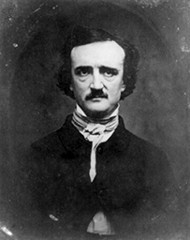 |
| Edgar Allen Poe is one of the most well know authors in this genre. His works heavily feature Gothic tropes such as madness and death. |
The narrative perspective, like that of most of the other works we have read thus far, is in the first person. This narrative perspective works exceptionally well for this tale, because it allows the reader to witness the catastrophic demise of the House of Usher both as insiders and as outsiders. Since our narrator is not a member of the Usher clan, we witness the events that unfold as outsiders. Neither our heritage, nor the heritage of the narrator is at stake here, so we can approach the disaster with a more unfettered view of the decadence and corruption which has led to this destruction. On the other hand, though, since the narrator is a close family friend of the last members of the House of Usher, we gain a better understanding of the history of the family and the forces which have been at play in undermining the foundation of the House of Usher for centuries. Being able to see the situation from both sides like that really made the tale engaging.
No comments:
Post a Comment